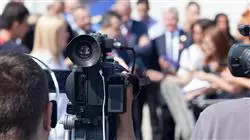University certificate
The world's largest faculty of journalism and communication”
Introduction to the Program
Political communication puts into action specific strategies that require the journalist to have in depth knowledge of political functioning and its message. This Professional master’s degree will enable you to work with the efficiency of an expert in the sector”

Defining what politics is key. Since the beginnings of power in government, it is difficult to find a definition that accurately captures its meaning given the complexity of the concept: politics surrounds everything and everyone, from the prices of products bought at the supermarket to the salaries earned by each worker or the protection of the most disadvantaged.
Politics generates changes in society; therefore, it is essential to have specialized knowledge of the political environment and its development based on truthful, contrasted and well elaborated information.
In this way, political journalists become authentic actors and defenders of the truth, both externally in the media and newspapers, as well as internally, elaborating the communication plans of the parties that go for election at the polls.
The main objective of this Professional master’s degree is the specialization of the professional journalist in Political Journalism. To achieve this, you will have to go through a practical case study and the completion of complementary activities that generate specialized knowledge.
The degree of specialization gained in the Professional master’s degree in Political Journalism allows the professional journalist to achieve a high level of advanced knowledge and development in the political environments surrounding the world of journalism, in the most relevant and significant aspects in any of its professional lines.
The proven experience of TECH Global University is available to you in this complete program”
The Professional master’s degree in Political Journalism contains the most complete and up-to-date educational program on the market. The most important features include:
- The latest technology in online teaching software
- A highly visual teaching system, supported by graphic and schematic contents that are easy to assimilate and understand
- Practical cases presented by practising experts
- State-of-the-art interactive video systems
- Teaching supported by telepractice
- Continuous updating and recycling systems
- Autonomous learning: full compatibility with other occupations
- Practical exercises for self evaluation and learning verification
- Support groups and educational synergies: questions to the expert, debate and knowledge forums
- Communication with the teacher and individual reflection work
- Content that is accessible from any fixed or portable device with an Internet connection
- Supplementary documentation databases are permanently available, even after the program
A Professional master’s degree supported by the best technology, which will allow you to learn in a fluent and efficient way”
Or teaching staff is made up of practising specialists. A multidisciplinary team of trained and experienced professionals in different environments, who will develop the theoretical knowledge efficiently, but, above all, will contribute the practical knowledge derived from their own experience to the program.
This mastery of the subject matter is complemented by the effectiveness of the methodological design, developed by a multidisciplinary team of e-learning experts who integrate the latest advances in educational technology.
In order to achieve success in this program, the professional will have the help of a innovative interactive video system, through which they will be able to put into practice the telepractice and learning from an expert systems. A concept that will allow them to integrate and fix learning in a more realistic and permanent way.
Learn all the aspects that successful political communication professionals must master"

With professors who are experts in this area of work, this program is a unique opportunity for professional development"
Why study at TECH?
TECH is the world’s largest online university. With an impressive catalog of more than 14,000 university programs available in 11 languages, it is positioned as a leader in employability, with a 99% job placement rate. In addition, it relies on an enormous faculty of more than 6,000 professors of the highest international renown.

Study at the world's largest online university and guarantee your professional success. The future starts at TECH”
The world’s best online university according to FORBES
The prestigious Forbes magazine, specialized in business and finance, has highlighted TECH as “the world's best online university” This is what they have recently stated in an article in their digital edition in which they echo the success story of this institution, “thanks to the academic offer it provides, the selection of its teaching staff, and an innovative learning method aimed at educating the professionals of the future”
A revolutionary study method, a cutting-edge faculty and a practical focus: the key to TECH's success.
The most complete study plans on the university scene
TECH offers the most complete study plans on the university scene, with syllabuses that cover fundamental concepts and, at the same time, the main scientific advances in their specific scientific areas. In addition, these programs are continuously being updated to guarantee students the academic vanguard and the most in-demand professional skills. In this way, the university's qualifications provide its graduates with a significant advantage to propel their careers to success.
TECH offers the most comprehensive and intensive study plans on the current university scene.
A world-class teaching staff
TECH's teaching staff is made up of more than 6,000 professors with the highest international recognition. Professors, researchers and top executives of multinational companies, including Isaiah Covington, performance coach of the Boston Celtics; Magda Romanska, principal investigator at Harvard MetaLAB; Ignacio Wistumba, chairman of the department of translational molecular pathology at MD Anderson Cancer Center; and D.W. Pine, creative director of TIME magazine, among others.
Internationally renowned experts, specialized in different branches of Health, Technology, Communication and Business, form part of the TECH faculty.
A unique learning method
TECH is the first university to use Relearning in all its programs. It is the best online learning methodology, accredited with international teaching quality certifications, provided by prestigious educational agencies. In addition, this disruptive educational model is complemented with the “Case Method”, thereby setting up a unique online teaching strategy. Innovative teaching resources are also implemented, including detailed videos, infographics and interactive summaries.
TECH combines Relearning and the Case Method in all its university programs to guarantee excellent theoretical and practical learning, studying whenever and wherever you want.
The world's largest online university
TECH is the world’s largest online university. We are the largest educational institution, with the best and widest online educational catalog, one hundred percent online and covering the vast majority of areas of knowledge. We offer a large selection of our own degrees and accredited online undergraduate and postgraduate degrees. In total, more than 14,000 university degrees, in eleven different languages, make us the largest educational largest in the world.
TECH has the world's most extensive catalog of academic and official programs, available in more than 11 languages.
Google Premier Partner
The American technology giant has awarded TECH the Google Google Premier Partner badge. This award, which is only available to 3% of the world's companies, highlights the efficient, flexible and tailored experience that this university provides to students. The recognition as a Google Premier Partner not only accredits the maximum rigor, performance and investment in TECH's digital infrastructures, but also places this university as one of the world's leading technology companies.
Google has positioned TECH in the top 3% of the world's most important technology companies by awarding it its Google Premier Partner badge.
The official online university of the NBA
TECH is the official online university of the NBA. Thanks to our agreement with the biggest league in basketball, we offer our students exclusive university programs, as well as a wide variety of educational resources focused on the business of the league and other areas of the sports industry. Each program is made up of a uniquely designed syllabus and features exceptional guest hosts: professionals with a distinguished sports background who will offer their expertise on the most relevant topics.
TECH has been selected by the NBA, the world's top basketball league, as its official online university.
The top-rated university by its students
Students have positioned TECH as the world's top-rated university on the main review websites, with a highest rating of 4.9 out of 5, obtained from more than 1,000 reviews. These results consolidate TECH as the benchmark university institution at an international level, reflecting the excellence and positive impact of its educational model.” reflecting the excellence and positive impact of its educational model.”
TECH is the world’s top-rated university by its students.
Leaders in employability
TECH has managed to become the leading university in employability. 99% of its students obtain jobs in the academic field they have studied, within one year of completing any of the university's programs. A similar number achieve immediate career enhancement. All this thanks to a study methodology that bases its effectiveness on the acquisition of practical skills, which are absolutely necessary for professional development.
99% of TECH graduates find a job within a year of completing their studies.
Professional Master's Degree in Political Journalism
If there is a spark that lights the fuse of debate because of its weight in the socioeconomic landscape, it is politics. Being the core of power that carries the course of nations, this governmental component has always echoed in public opinion. Therefore, it is important that all personnel related to the field of journalism deepen this nuance and can provide an impartial, complete and accurate view of the actions of the State. The Professional Master's Degree in Political Journalism offered by TECH Global University arises precisely as a complement of remarkable category, not only to enhance the knowledge inherent to the role of communicator, but to learn to dissect the political sphere from the rigor of the media. Through an intensive but motivating virtual training coupled with a fully qualified teaching staff, cutting-edge academic models and self-regulated lessons, we provide an efficient way of qualification to all professionals in social communication and journalism. In this way, they will have curricular support in a field that has great opportunities for job growth.
Study political journalism completely online
Throughout history politics and journalism have shared an interesting bond. It was during the 1st century BC that the emperor Julius Caesar reported governmental affairs to the citizens by means of the so-called "Public Act". Since then, the links between the government and the media have been as recurrent as they have been questioned due to the latent intentions of both sides: the former for exercising an unnatural hegemony and the latter for leaving impartiality aside in favor of private interests. Today, more than ever, we need professionals with strong ethical codes that bring together the pristine ideas of both concepts: journalism and politics. Our Professional Master's Degree is the answer to that dichotomy. With a solid syllabus of flexible classes, we will instruct you on topics such as: parliamentary journalism, institutional communication, political discourse analysis, international coverage, social media management, etc. By opting for TECH you have the opportunity to bet not only on a better position, but on a promising social change.







